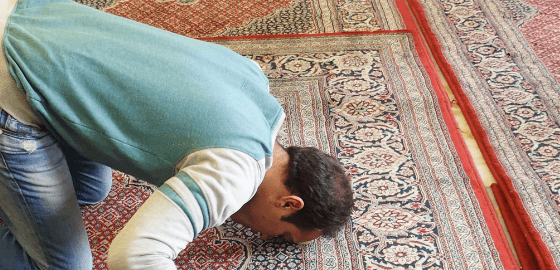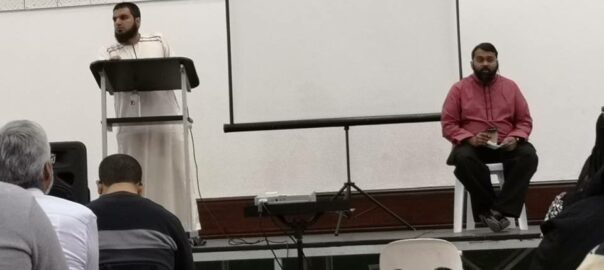Anas ibn Malik reported that the Messenger of Allah ﷺ said, “There will be division and sectarianism in my nation, and a people will come with beautiful words and evil deeds. They will recite the Quran, but it will not pass beyond their throats. They will leave the religion as an arrow leaves its target, and they will not return to it as the arrow does not return to its bow. They are the worst of the creation.”
Abu Dawud 4765, Grade: Sahih
The Rise of Extremism
Recently, there has been an uptick in extremist behaviour online among young Muslims. This overzealous approach to Islam comes from a good place; protective jealousy over the religion and sincerely wanted to defend it. However, it is mischanneled into fighting and hating other Muslims. The recent rise in extremism can be attributed to several factors including disillusionment with local scholars, fear of the rise of liberalism among Muslims, and especially the sensationalist propaganda of hate preachers.
In recent times, various figures rose to fame in online Muslim circles by spreading defamation, slander, and misinformation about other Muslims. They built careers around tearing others down and attempting to destroy the reputation of others. Many people see through their manipulation tactics, lies, and slander. Sadly, enough people have bought into it to produce a new generation of angry young men with Kharijite-like personalities.
The Prophet ﷺ warned us about extremist groups that will rise in every generation. These extremists spread hatred and division among Muslims, but eventually they fizzle out and leave either the movement or Islam itself. Today, my message is for those young men who may be tempted to join such movements. I want to focus on what specific phrase in the above hadith that we do not ponder over enough. The Prophet ﷺ warned us, “They will leave the religion as an arrow leaves its target, and they will not return to it as the arrow does not return to its bow.”
This hadith warns us that extremism leads to apostasy. When a Muslim embraces a hate-fuelled angry version of Islam, the result is that either they will mature and leave the movement eventually, or that they will stop practicing the religion altogether, or even apostate. This is a profoundly serious consequence that should cause you to think twice before joining such groups.
A Lost Generation
When I was young, the extremist movements of that generation were different. Their focus was on politics and war, and they made takfir (excommunicated) anyone who did not align with their political agendas. Entire Muslim countries and their populations were branded disbelievers by these groups, and they even turned to violence and started murdering Muslims in the name of the religion.
I knew many members of these groups personally and would often preach the middle path to them. Over the years, I have witnessed dozens of hardcore practicing Muslims transition into non-practicing Muslims, hadith rejectors, and even apostates. I saw an entire group of people “They will leave the religion as an arrow leaves its target,” in real-time, and they all had one thing in common; they were extremists during their youth.
Over the past decade, that group fizzled out for the most part and we assumed the Fitna was over. Unfortunately, the next generation has produced a new type of extremism. A group of grifters realized that they can attain fame overnight if they dedicate their time to manipulating the masses through slandering others. They spend hours searching for quotes to take out of context so that they can portray righteous people in the worst possible light. They succeeded in finding an audience, and that audience is that starting to display all the characteristics of the Khawarij.
This generation of Khawarij are obsessed with the faults of others, especially people of knowledge. They spend hours online gossiping, arguing, debating, declaring takfir, and spreading hatred of others. They neglect their own souls in the process. They have become a gang of bitter angry young man hiding behind anonymous social media accounts, the way previous generation hid behind their kunyas.
As An Arrow Leaves Its Target
I understand that these young men have genuine concerns and frustrations. Every extremist movement in history started with genuine frustrations that pushed people over the edge. If you find yourself tempted to join these outrage movements, take a moment to reflect on why extremists eventually “They will leave the religion as an arrow leaves its target,” It lies in the heart of the matter, the actual spiritual heart of the believer.
Islam is a religion that emphasized purification of the soul, and constant self-reformation. A believer can never be confident in his own piety and status. Repentance and daily spiritual improvement are necessary to grow closer to Allah. But the extremist’s focus is external, not internal. He is obsessed with the faults of others, to such an extent that he becomes oblivious to his own faults. He spends so much time searching for the mistakes in others, gossiping, backbiting, and stirring hatred in his own heart, the consequences of this is that he neglects his own spiritual growth. The human heart is fragile. If we are not working on purifying it, then slowly it is being corrupted without us even realizing it.
Consider the following two scenarios and the results of each. Young Man A embarks on a journey of self-reformation. He meets a righteous scholar, studies the religion, makes time daily for zikr and istighfār, and is focused on improving his relationship with Allah. This young man spends the rest of his life trying to attain Ihsaan and serve the ummah. Over time, he grows into a humble, gentle, loving, spiritual soul whose very presence attracts others to Islam. His very existence becomes a form of Dawah as people can feel the spirituality emanating from his soul.
Imagine now if he had a twin brother. This brother, around the same time, also decides to become a practicing Muslim, but he chooses to spend his time watching 4-hour long videos about the faults and mistakes of other Muslims. He is so angry from watching these videos that it begins to consume him. His anger needs an outlet, so he spends his time on social media badmouthing the righteous and spreading slander. He has no space in his heart for the remembrance of Allah, because it is consumed by hatred and anger. He stays up late to watch a 5-hour livestream of others like him badmouthing the righteous, then spent hours arguing about what he heard on social media. He falls asleep late and misses his Fajr. Slowly, this becomes a habit.
Eventually, he stops going to the Masjid because he sees all the Imams as deviants and sell outs. He says he will pray at home, but he is so distracted by his online debates that he rushes his prayer and rarely concentrates. Slowly, he starts to miss prayers more regularly without even realizing it. Piece by piece, his faith is chipping away without him even realizing it.
A decade later, the first brother has a happy family, a good reputation in his community, and remains firm on the path to Paradise. Unfortunately, the second brother has burned out. His family have long abandoned him because they could not handle his extremism and constant anger. His friends have either left the movement or left the religion altogether, and the community ignores him as some kind of weirdo.
He abandoned the community when he abandoned the Masjid, and overtime has lost his faith through spiritual neglect. He no longer finds joy in gossip and slander and has become numb to hatred and fighting. Burned out and alone, he is at a dangerous fork in the road.
If he is sincere and humble, he realizes the error of his ways. He repents, reattaches himself to the ulema, spends a lot of time writing to the various scholars he slandered asking for forgiveness, and begins his journey back to Allah.
However, if he is arrogant then he refuses to see how any of this is his own fault. He blames his community. He blames the Ulema. He blames Islam. Bitter, lonely, and refusing to shoulder any blame for his own choices, he eventually stops practicing Islam altogether, or even apostates. Never to recover or return. A fulfilment of the prophecy, “They will leave the religion as an arrow leaves its target, and they will not return to it as the arrow does not return to its bow.”
A Message from The Heart
The above scenarios are not completely hypothetical. I have witnessed this happen to dozens of people a decade ago. My dear brothers who have bought into slander and hatred, you are in danger of walking down this same path. Take some time to reflect and make your next choice wisely because this concerns your Afterlife.
My advice is simple; there is no benefit in spending your time obsessed with the (perceived) faults of others, gossiping about them, and spreading hatred. If you find a specific scholar questionable, then find yourself a different scholar to attach yourself to and study under.
Take time to learn Islam from righteous ulema, not from internet personalities who prey on your jealousy for the religion. Avoid these types like a plague because following them will make you a bitter angry person, and this will impact every aspect of your life, especially your spirituality. Focus on learning your religion, spending time in the company of the righteous, building beautiful families, and serving your communities. Do not wait for ten or twenty years to pass before you realize it is too late, and you end up another statistic of this prophecy.
We ask Allah for sincerity, righteousness, steadfastness, and moderation. And we ask Allah to silence to slanders completely and to protect our youth from being led astray by them.







